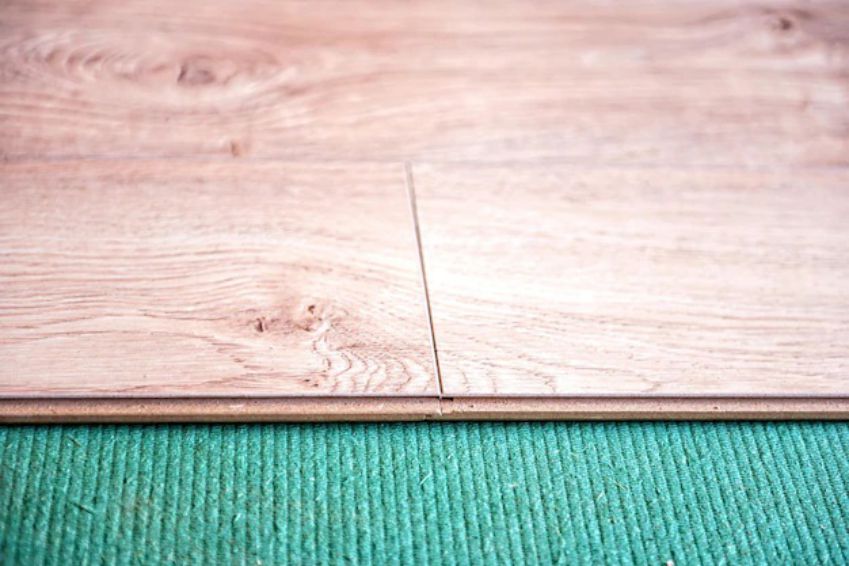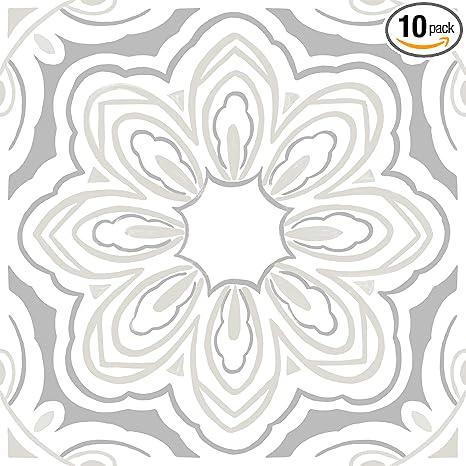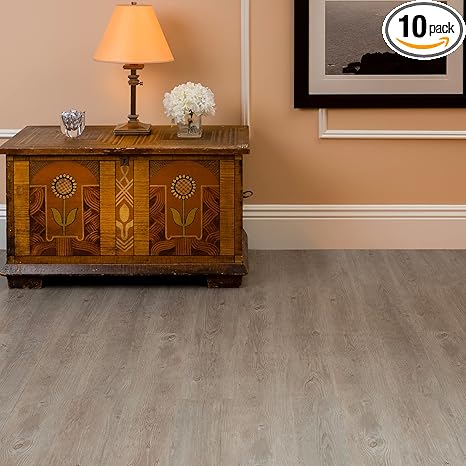Vinyl flooring is practical and has a wood-like look. They offer several amazing features that are reasonably priced. Vinyl flooring provides your home with a beautiful appearance. That is why many choose to have vinyl flooring installed in their homes or workplaces.
Vinyl flooring is simple to install. You may also install vinyl flooring on your own. However, you may be confused about the vinyl flooring is loud or not. This article will explain what a vinyl floor is and whether or not it is loud.
Table of Contents
Are Vinyl Floors Noisy?
Vinyl flooring is not a source of the noise. They can absorb sounds. Any sound or noise made on the vinyl flooring is absorbed and softened by the floor. If you have children or dogs in the home, they will most certainly make a lot of noise. And vinyl flooring, with its noise-absorbing properties, is the perfect alternative to it.

However, if the leveling is not done correctly while installing the vinyl flooring, it might cause noise. In addition, if the boards’ joints with the subfloor become strained or loose, they could make a cracking sound when they move.
Otherwise, if the vinyl flooring is properly installed, it will not generate any noise. Furthermore, when the floor softens, the sounds and noises on it will diminish.
Does vinyl flooring generate a lot of noise?
Vinyl flooring, in general, does not generate a lot of noise. Vinyl flooring is one of the noise-absorbing flooring options. This flooring also muffles noises and sounds on the floor. As a result, vinyl flooring is a great way to cut down on noise in your home.
However, sounds from the vinyl flooring may occur from time to time. These sounds might be the result of the subfloor’s poor leveling. The joints might become loose or corrode over time. The vinyl flooring may also generate sounds via these seams.
Otherwise, vinyl flooring is noiseless. As a result, this flooring is appropriate for dogs and children in the home.
Five Causes of Noisy Vinyl Flooring
Vinyl flooring, in general, does not generate a lot of noise. However, noise from vinyl flooring may be caused by a variety of factors. Let’s take a look at why vinyl flooring produces noise.
Uneven leveling
If the vinyl flooring is not level with the subfloor, it might make a lot of noise. The uneven flooring vibrates and makes noise as you walk on it. It will also generate sounds at the plank-to-subfloor joints.
Planks with flaws
Sometimes the vinyl planks have flaws that cause a popping sound. When you attach the boards to the subfloor, the nails might make popping or cracking noises.
The sound may be more bothersome if you haven’t acclimated the floor before putting down the vinyl flooring.
The space between the floor and the subfloor
Sometimes the vinyl flooring is not properly bonded to the subfloor. As a result, there is a gap or space between the vinyl floor and the subfloor. When you walk across the floor, this gap will produce hollow noises.
Change in humidity level
A change in humidity level might also be the cause of the noise on the vinyl floor. For example, if the humidity level is lower than the appropriate level, the moisture level will also fall, and cracking noises will be heard.
In contrast, if the humidity level exceeds the appropriate level, the floor will expand and become moist. This will also make a bothersome noise on the vinyl floor.
Friction between the planks
The planks of vinyl flooring may have friction between them. The friction of two boards on the floor may produce noise.
How can I make my vinyl floor quieter?
Vinyl flooring may be noisy for a variety of reasons. However, these sounds may be rather irritating at times. As a result, you must address the noise issue. Let’s have a look at how you may make your vinyl floor quieter.
Soundproof underlayment
When installing vinyl flooring, employ soundproof underlayment between the planks. Acoustic underlayment, for example, may make your floor noise-free.
However, if you have already laid the vinyl flooring, you must remove the planks and replace them with soundproof underlayment before replacing vinyl planks.
Carpets and rugs
While vinyl flooring is not actual wood, it may mimic the sound of wood. You may cover the floor with carpet to muffle the sound. Carpet is the most cost-effective way to minimize noise.
Rugs and rug cushions may also help muffle floor noise. In cold weather, they will help make your floor more pleasant and toasty.
Foam layer
Some vinyl floors have a foam layer underneath them. This may help muffle the sound of the floor. Resilient vinyl flooring, for example, is soundproof, water-resistant, and long-lasting.
Powder and lubricant
Applying lock lubricant and talcum powder to the joints of vinyl floor planks might help minimize noise.
Does vinyl flooring squeak?
Vinyl flooring, in general, does not squeak. Furthermore, the majority of high-quality vinyl flooring is soundproof. They don’t squeak or make a sound. They also help to muffle noises on the floor.
However, if your vinyl floor creaks, it might be due to an issue with the subfloor. Sometimes the subfloor’s leveling is off, or you don’t have soundproof underlayment. This might be causing the vinyl floor to squeak.
What can I do to keep my vinyl floor from creaking?
Creaking vinyl flooring may be rather upsetting at times. If you want to fix the creaking floor, you may use certain approaches. Let’s look at ways to stop your vinyl floor from squeaking.
- First, when installing the vinyl flooring, you may want to use a soundproof underlayment.
- Use cushioned foam. To keep your vinyl flooring from squeaking, place padded foam underneath it.
- Replace faulty planks: If your vinyl planks are defective, you can replace and reinstall them.
- Tighten the joints: If the flooring includes screws, nails, or other joints, you may tighten the joints between the planks.
- Use mats or rugs: You may lessen the creaking sound by using carpets, mats, or rugs.
What can I do to reduce the noise from the upper floors?
Noise from upper floors might sometimes come from a variety of sources. When you walk on the floor, move furniture, or drop anything on the floor, it might cause sounds to be heard above. Here are some suggestions to help you eliminate the noise from the above level.
- To minimize noise, apply acoustic foam to the ceiling and walls.
- To reduce noise from upstairs, make the ceiling denser or thicker.
- You may use green glue to locate the source of the sound or disturbance.
- To reduce noise, you may also place acoustic tiles on the ceiling.
- You may soundproof the ceiling by installing robust channels.
- If the upstairs noise is caused by neighbors, you should speak with them about how to stop the noise.
Is the sound of luxury vinyl flooring audible?
Luxury vinyl flooring is a multi-layered form of vinyl flooring. Luxury vinyl flooring is often not noisy. This vinyl flooring is also soundproof and water-resistant. Luxury vinyl flooring has numerous layers, and luxury vinyl flooring aids in sound and noise reduction.
However, premium vinyl flooring may be noisy for a variety of reasons. For example, if the subfloor is not built of wood or concrete and is not properly leveled, the floor might be noisy. Luxury vinyl floor planks that aren’t level or uneven will slide and make noise.
Is it true that vinyl flooring absorbs sound?
Vinyl flooring does absorb sound. Vinyl flooring is capable of absorbing and softening disturbances and sounds. Vinyl flooring often has numerous layers that assist in decreasing noise. So, if you want a soundproof and quieter floor, vinyl flooring is a good option.
Furthermore, certain materials in vinyl flooring absorb sound. The flooring is designed with a foam backing that absorbs noise. Because of these characteristics, the vinyl floor is perfect for sound absorption.
Is vinyl flooring more silent than laminate flooring?
Vinyl flooring is indeed quieter than laminate flooring. The majority of vinyl flooring patterns have a foam backing. The vinyl flooring is quieter as a result of these designs. The materials used to make vinyl flooring are also flexible, which helps to cut down on the noise.
However, laminate flooring lacks these further sound-reducing characteristics. Furthermore, laminate flooring requires underlayment to be soundproof.
Vinyl flooring, on the other hand, requires a soundproof underlayment for further soundproofing protection. However, vinyl flooring is quieter than laminate flooring.
Is vinyl flooring effective at soundproofing?
Yes, vinyl flooring has great soundproofing properties. Vinyl flooring is widely used because of its ability to absorb sound and disturbance. In general, vinyl flooring has the inherent ability to attenuate noise and sound.
Furthermore, new, high-quality vinyl flooring includes a foam back that absorbs noise. As a result, you may also apply vinyl flooring to the walls and ceiling to limit noise from above. The materials and styles of vinyl flooring are also appropriate for soundproofing.
Vinyl floor manufacturing materials, for example, are flexible and may absorb sound and disturbance. Vinyl flooring might be an excellent choice for soundproofing your house.
If you want amazing features and low-maintenance flooring, vinyl floors are one of the best solutions for your house. Vinyl floors are a kind of flooring that is both water-resistant and durable, as well as having the ability to reduce noise and sound.
Noises from vinyl flooring may occur at times, but they are usually caused by the subfloor. Some approaches may also be used to remedy the creaking and sound concerns associated with vinyl flooring. This post will provide you with soundproof flooring options.




